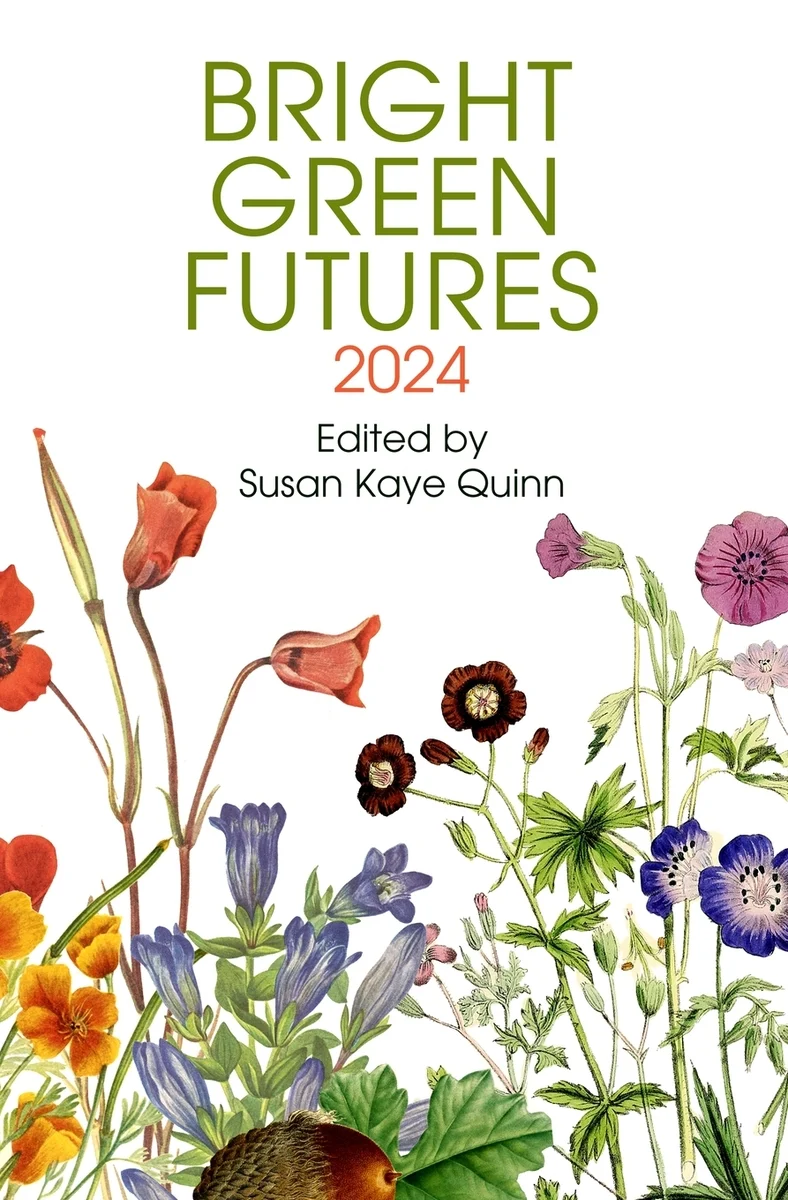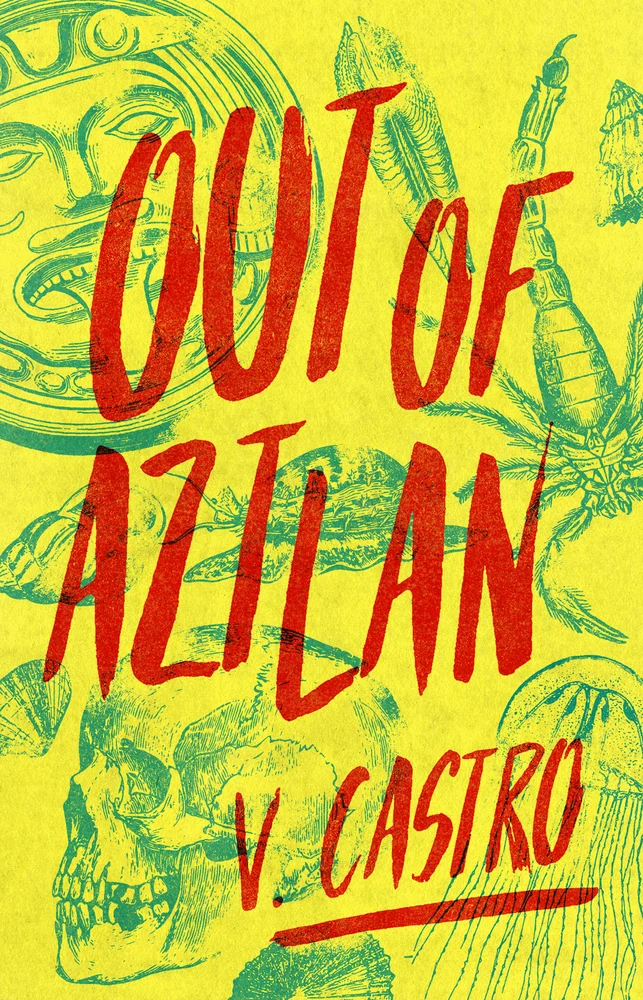Review: Bright Green Futures
195 pages Edited by Susan Kaye Quinn (2024)
Read this if you like: Solarpunk, short speculative fiction, inventive worldbuilding
tl;dr summary: Collection of shorts that each imagine a hopeful future in a different way

195 pages Edited by Susan Kaye Quinn (2024)
Read this if you like: Solarpunk, short speculative fiction, inventive worldbuilding
tl;dr summary: Collection of shorts that each imagine a hopeful future in a different way

I love luxuriating in a well-built world. When I'm reading a sci-fi or fantasy novel, I'm always a fan of the cozier scenes when the characters are exploring their world, and I can absolutely get sucked into descriptions of the history or technology, even when they're not actively moving the plot forward. There's a energy in getting to know a fantastical world. It's a lower-key energy than what's generated by plot movement but it can still be enough to keep a reader invested in something like a novel, where you don't need the pace to be consistently quick.
With short fiction, worldbuilding becomes more of a challenge, especially if you're using a completely secondary world. It's especially challenging when you're working at a flash length and really don't have any extra words to spare, though I would also say there's one advantage to having an under-1,000 word constraint: you're less likely to have info dumps because there's simply not space for them. When you're working in the 3,000-8,000 word range, the temptation to info dump is strong.
We were super stoked at After Happy Hour when we finally started being able to pay our contributors. It wasn't much at first—just a $10 token payment per contributor, which for us felt just on the good side of not insulting but still seemed manageable if we didn't bring in much revenue that reading period. What we found, though, was that once we started paying contributors our revenue went up, too. More people were willing to pay for expedited submissions, or throw us a few bucks as a tip jar submission, and we also started selling more print issues. All together, that meant we were able to increase our pay rates within just a couple years to where they are now.
Currently, After Happy Hour pays contributors $2.50 per issue page, with a minimum of $15 and a maximum of $50 per work. Functionally, this means we end up paying $15 per poem or work of art, with prose writers getting $15-$50 depending on the length of their work. That puts us into semi-pro territory for art and poetry, and we perch on the border between token and semi-pro payment for fiction and creative nonfiction depending on the length of the work.
V. Castro 186 pages Creature Publishing (2022)
Read this if you like: Feminist horror, optimistic post-apocalypses, Aztec mythology and culture
tl;dr summary: Collection of short stories featuring powerful women fucking shit up in various ways and places.

I was looking through some of my older posts recently and realized there were a few submission lists that could probably use a refresh. Sure enough, when I looked through them I found some markets that have closed, and realized they were missing a few that I’ve discovered since writing them. So if there’s anyone out there with work looking for a home, here are some potentially useful lists:
…all three now up-to-date and accurate, at least for the next little while. I also figured, since I’m in researching markets mode, I’d round up a few others that folks can send their work to no matter when they stumble across this post. Here are some literary journals not featured on any of those lists above that generally stay open for submissions year-round and have been around for at least 10 years (which means the odds are good they’re not going anywhere anytime soon).
I completely understand why writers might find the process of submitting overwhelming. It's not a lack of resources. I'd say it's the opposite problem. There are so many newsletters and online listings for finding publishers that it can be hard to even figure out where to start.
Currently, I’d say there’s three clear top publisher databases: Duotrope, Submission Grinder, and Chill Subs. All three have built-in submission trackers, which means they provide user-reported stats along with info on submission guidelines and other relevant details. I've used all of these sites at various points but I wouldn't say that any one of them is perfect, or even the definitive best option for every writer. Here are my thoughts on the pros and cons of each site and which situations, genres, or types of writers it's the best for.
Both of the collections I've put together so far have been linked, which made deciding what stories to include a bit easier. In fact, almost all the pieces in Cryptid Bits were written specifically for the chapbook, and the same was true for about half of the stories in Luck and Other Disasters. There was still some curation work that needed to happen—in both cases I wrote some stories that didn't end up in the final version, and it took a bit of fiddling to get the pieces I did include into the right order. But since each of those books occupies a self-contained world, with shared characters and settings, deciding which things fit into each book was pretty straightforward.
That's not the case for every short story collection. I knew that in an abstract, of course, and now I’m getting a first-hand lesson. A few months ago, I realized I have enough speculative short stories to put together a collection—way more than enough, actually, which is mostly a good problem to have. I have options and can mix-and-match things to find the exact right set of stories. But that’s also caused a bit of a delay in getting the manuscript assembled while I figure out how to even choose which ones belong together.
Jacob M. Appel 181 pages Black Lawrence Press (2016)
Read this if you like: Robert Olen Butler, Matthew Cheney, Juan Villoro
tl;dr summary: A study in the craft of writing short stories, with 10 stories that each have a different lesson to teach.

I’m mostly a pantser when it comes to the writing process. Now and then I’ll know where a story’s going ahead of time, and may even do a bit of outlining for longer works, but my preferred approach is just to start writing and let the story tell me where it wants to go.
Because of this, my rough drafts don’t tend to be what I would call “finished stories.” They have a beginning, middle, and end (usually) but they still don’t have an effective arc, are riddled with inconsistencies, and have the kind of rambling pacing that feels like the author’s just making shit up as they go instead of intentionally moving from one scene to the next. Which makes sense, because that’s exactly what happened.
The editing process is when I wrangle these messy rough drafts into something other people can actually read and make sense of (and hopefully enjoy). I do have some help in this process because I have an incredible writing group. But even with a workshop group or beta reader, you can’t expect them to do all the heavy lifting for you. Most stories need to go through multiple editing rounds before they’re fully finished—more versions than you can realistically expect anyone else to read.
Dorene O’Brien 156 pages Baobab Press (2019)
Read this if you like: Karen Russell, Carmen Maria Machado, quirky short fiction tl;dr summary: Collection of (mostly) literary stories in which characters hope, for better or worse (mostly worse).
